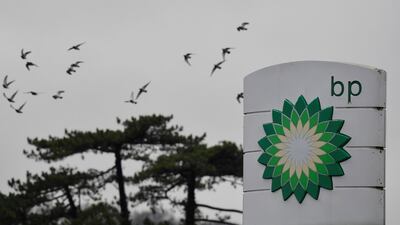Global energy major BP’s adjusted first quarter net profit more than tripled, as oil prices rebounded and divestments boosted income.
Underlying replacement cost profit for the three months to the end of March soared to $2.6 billion from a $791 million in the year-earlier period, the company said in a statement on Tuesday. Net profit to shareholders rose to $4.67bn, compared with a $4.35bn loss a year earlier.
"This quarter demonstrates what we mean by performing while transforming," chief executive Bernard Looney said. "With the acceleration of divestment proceeds, together with strong business performance and the recovery in the price environment, we generated strong cash flow and delivered on our net debt target around a year early."
The company plans $500m of share buybacks in the second quarter which, "alongside our resilient dividend, support the growth in distributions to shareholders", Mr Looney said.
BP generated around $11bn of cash inflow in the first quarter, and intends to distribute 60 per cent of $1.7bn surplus cash flow this year to shareholders through buybacks, subject to maintaining a strong investment grade credit rating. The remaining 40 per cent is being used to strengthen the company's balance sheet.
The company attributed the rise in quarterly income to "an exceptional gas marketing and trading performance, significantly higher oil prices and higher refining margins".
Oil prices are up 27.5 per cent since the beginning of this year, after the energy industry saw demand plummet in 2020 due to a Covid-19 economic induced slowdown that sent the global economy into its deepest recession since the 1930s.
BP's divestments and other proceeds raised $4.8bn during the quarter, including $2.4bn from the sale of a 20 per cent stake in Oman Block 61 and a $1bn final instalment for the sale of its petrochemicals business.
The cash flow generated during the quarter also helped the company reach its target of reducing net debt to $35bn ahead of plan. Net debt fell by $5.6bn to $33.3bn at the end of March, BP said.
"BP is now retiring this target and remains committed to maintaining a strong investment grade credit rating," it added.
During the second quarter, the company expects its cash flow to be affected by an annual $1.2bn Gulf of Mexico oil spill payment and severance payments, although a small improvement in realised refining margins is anticipated.
"As a result ... we expect a cash flow deficit in the second quarter."
However, the company expects to generate surplus cash in the second half of the year on an oil price above $45 per barrel and a realised refining margin of about $13 per barrel.
BP said its capital expenditure in the first quarter reached $3.8bn, slightly lower than the $3.9bn spent in the first quarter of last year. It included a payment of $700m following the formation of an offshore wind joint venture in the US with Equinor and a $300m payment related to its share of UK offshore wind leases in a partnership with EnBW.
For the full year, BP expects capital expenditure to be around $13bn.
BP, like global peers such as Shell, aims to reach net zero emissions by 2050 as it integrates more renewables into its business.
"We’ve delivered disciplined, strategic progress right across BP, including building a high-quality offshore wind business, making great strides in our electrification agenda and setting ourselves up for further growth in the Gulf of Mexico," Mr Looney said.
BP expects the oil market to continue rebalancing and for global stocks to decline by the end of 2021. It sees oil demand recovering this year due to strong economic growth in US and China as well as the easing of movement restrictions amid mass Covid-19 inoculation programmes.
"Opec+ behaviour is a key factor in oil prices and market rebalancing," BP said.
It also expects global gas demand to grow above 2019 levels, and liquefied natural gas demand to increase as a result of higher Asian imports.
Although the company sees industry refining margins improving over the course of 2021 compared to the first quarter, they are expected to remain weaker than pre-Covid-19 levels, it said.

